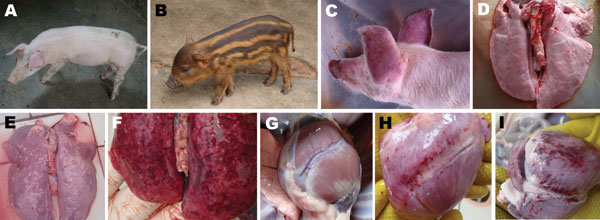Porcine Reproductive and Respiratory Syndrome in Hybrid Wild Boars, China
Jiaqiang Wu
1, Shaoning Liu
1, Shun Zhou, Zhao Wang, Kun Li, Yuyu Zhang, Jiang Yu, Xiaoyan Cong, Xiaowei Chi, Jun Li, Shaojian Xu, Yijun Du, Sufang Ren, and Jinbao Wang

Author affiliations: Author affiliations: Shandong Academy of Agricultural Sciences, Jinan, People’s Republic of China (J. Wu, Y. Zhang, X. Cong, J. Li, S. Xu, Y. Du, S. Ren, J. Wang); Shandong Key Laboratory of Animal Disease Control and Breeding, Jinan (J. Wu, S. Liu, K. Li, Y. Zhang, J. Yu, X. Cong, J. Li, Y. Du, S. Ren, J. Wang); Shandong Agricultural University, Tai’an, People’s Republic of China (S. Liu, J. Wang); Qingdao Agricultural University, Qingdao, People’s Republic of China (S. Zhou, Z. Wang, K. Li, J. Yu); Shandong University of Traditional Chinese Medicine, Jinan (X. Chi)
Main Article
Figure 2

Figure 2. Experimental infection of domestic Duroc crossbred pigs and hybrid wild boars with porcine reproductive and respiratory syndrome virus isolate ZCYZ. A) Domestic Duroc crossbred pig (control) injected with Dulbecco minimal essential medium (DMEM), showing normal skin color. B) Hybrid wild boar (control) injected with DMEM, showing normal skin color. C) Red discoloration in ears of a domestic Duroc crossbred pig infected with ZCYZ). D) Normal pathologic appearance of lungs in a control domestic Duroc crossbred pig. E) Pulmonary hyperplasia and consolidation in a hybrid wild boar infected with ZCYZ. F) Edema and hemorrhage in the lungs of domestic Duroc crossbred pig infected with ZCYZ). G) Normal pathologic appearance of heart in a control hybrid wild boar. H) Cardiac hemorrhage and edema in a hybrid wild boar infected with ZCYZ. I) Hemorrhagic spots in heart of domestic Duroc crossbred pig infected with ZCYZ.
Main Article
Page created: August 03, 2011
Page updated: August 03, 2011
Page reviewed: August 03, 2011
The conclusions, findings, and opinions expressed by authors contributing to this journal do not necessarily reflect the official position of the U.S. Department of Health and Human Services, the Public Health Service, the Centers for Disease Control and Prevention, or the authors' affiliated institutions. Use of trade names is for identification only and does not imply endorsement by any of the groups named above.
